Contributions Special Edition Spring 2020
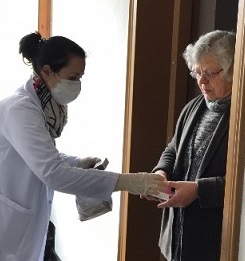
Health for All project supports PHC teams in facing COVID-19 challenges
‘COVID-19 has brought new, unknown challenges to all of us in the primary healthcare. We need tailored trainings in order to better protect ourselves and our patients during this COVID-19 situation- says Dhurata, an experienced head nurse in Peshkopi - a city located in North-East Albania. Since the outbreak of COVID-19 in the country (March 8, 2020), her work practice, as well as that of all PHC teams in Albania, has been adapted upon the health authorities’ guidelines. Therefore, Dhurata is now dealing also with home-delivering of medications to elderly people living alone, supporting the PHC team carry out passive triage for suspected cases with COVID-19 and remote medical consultations for chronic patients. Even though in her city, there are no confirmed cases with COVID-19 so far, Dhurata and her colleagues are afraid of this challenging situation mainly because of the lack of customized information on the safety of PHC professionals but also due to the shortage of personal protective equipment’s.
With most of attention being focused on hospital healthcare, an urgent need has emerged in Albania for the provision of tailored trainings on infection prevention and control in primary healthcare settings. In this regard, Health for All- an SDC project- has elaborated and published a set of educational materials in order to provide distance training to PHC teams on COVID-19. The materials are made available at the dedicated session for PHC professionals on the project’s website.
Previously, PHC teams in the two regions of the Project, have been supported in elaborating and adapting an infection prevention and control regulation upon each primary health center perspective. As declared by health professionals in these centers, the regulation has been particularly helpful in the COVID-19 context as it has guided them toward a fast re-organization of work and better coordination within the team.
HAP is publishing a weekly COVID-19 newsletter that gives an overview on the latest developments on PHC services in Albania, namely: measures taken for the adaptation of PHC services; latest guidelines from health authorities; statements from PHC professionals on the challenges they are facing and HAP planned measures in support of PHC teams. Click here to read the newsletter’s editions: http://www.hap.org.al/en/buletini/
Contact
HAP Team: info@hap.org.al
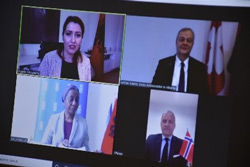
Albania
Switzerland, Norway, and UNDP finance the purchase of 30 ventilators to help counter COVID-19
A joint partnership agreement was signed virtually on April 10th 2020, between the Ministry of Health and Social Protection, the Swiss Embassy in Albania, the Royal Norwegian Embassy for Albania, and the United Nations Development Programme in Albania, outlining their support to help the Albanian health authorities combat COVID-19, by purchasing 30 ventilators.
This contribution complements the Albanian government’s engagement to increase its capacities and ensure sufficient life-saving machines for treating COVID-19 patients in intensive care.
The Swiss Government is providing 330,000 USD through its project ‘Health for All’, the Norwegian Government is providing approximately 300,000 USD, and UNDP 100,000 USD. The 30 ventilators are expected to arrive in Albania within the next two weeks and will be handed over to the Ministry of Health and Social Protection.
“This is a situation, in which we face more unknowns than certainties and the only way to confront this invisible enemy, is to join our forces. Therefore, your support in our battle against COVID-19 is essential in strengthening Albania’s public healthcare system capacities”, underlined the Minister of Health and Social Protection, Ogerta Manastirliu.
“These machines make the difference between life and death for many people. We are glad to be able to respond quickly to your demand and contribute jointly to the purchase of 30 additional respiratory machines for Albania’s hospitals”, said Swiss Ambassador Adrian Maître.
The Norwegian Ambassador for Albania, Jens Erik Grondahl highlighted: “Norway is proud to support Albania’s national effort against the Covid-19 pandemic by providing funds for the immediate purchase of ventilators for hospitals in an unprecedented partnership with Albanian Government, Switzerland and UNDP.”
“At this unprecedented time, UNDP stands by the side of Albania,” said UNDP Resident Representative in Albania Limya Eltayeb. “This initiative demonstrates the power of partnerships to help countries address critical health concerns amid this global pandemic. We are very pleased to join hands with the Swiss Government and the Norwegian Government to help the Albanian health authorities with critical emergency medical equipment which can save human lives”.
The first confirmed case of COVID-19 was registered in Albania on 9 March and 416 cases have been reported so far
Immediately after the outbreak, the Ministry of Health and Social Protection determined that ensuring enough ventilators is one of the highest priorities for Albania’s government.
Upon arrival in Albania, the 30 new ventilators will be owned and maintained by the Ministry of Health and Social Protection.
Contact
Bledar Hodobashi
Communications Officer, Embassy of Switzerland in Albania
bledar.hodobashi@eda.admin.ch

BiH
The role of nurses in addressing non communicable diseases: good practices
Erika Placella (February 2020)
Nurses as Change Agents
The World Health Assembly has designated 2020 the International Year of the Nurse and the Midwife[1]. The WHO estimates that the world needs 9 million more nurses and midwives to achieve Universal Health Coverage (UHC) by 2030. The largest shortages of nurses and midwives are in Low and Middle Income Countries (LMICs).
Nurses play a critical role in health promotion, disease prevention and delivering emergency, primary and community care, both for communicable and non-communicable diseases (NCDs).
Nurses are often the first providers that people see when they seek care. They are uniquely placed to act as effective practitioners, health coaches, spokespersons, and knowledge suppliers for patients and their families.
Investing in nurses is considered as good value for money: investments in education and job creation in the health and social sectors result in a triple return of improved health outcomes, global health security, and inclusive economic growth[2]. Quality and efficient primary health care services where most of the nurses work, are considered as cost effective and essential for achieving UHC.
The provision of appropriate and cost-effective promotive, preventive and curative services for NCDs requires a transformation of healthcare delivery models, with new roles and functions within multi-disciplinary teams. Nurses can definitely drive this change. As highlighted by a study carried out in the frame of a nursing education program supported by SDC in Kyrgyzstan, "transforming the family nurse's role from the doctor's assistant into an equal participant of the treatment and prophylactic processes with responsibilities on (…) NCDs" is crucial for this change to happen[3].
As the first point of contact, nurses are well positioned not only to detect, treat and refer patients with chronic conditions, but also to provide information, education and counselling on the prevention of NCDs. With their holistic approach to care and their focus on a person as a whole rather than on a disease, nurses are indeed well prepared to provide behavioral and lifestyle interventions that take into account the broad determinants of health and build on the strengths and resources of the individual and his/her community.
Empowering Nurses in Bosnia and Herzegovina
In Bosnia and Herzegovina (BiH), NCDs dominate the overall burden of disease and disability, accounting for 80% of the country's annual deaths[4]. Addressing them is therefore the foremost public health priority in the country. Major risk factors for NCDs in BiH are high blood pressure, tobacco use, insufficient physical activity and unhealthy nutrition.
Due to the critical shortage of family doctors in primary health care settings and in remote or hard-to-reach areas of the country, preparing nurses for both leadership and expanded responsibilities is essential[5] to address NCDs in a cost-efficient and effective manner.
Yet, expanding the role of nurses to address NCDs in BiH faces many obstacles such as slow reform processes, the lack of a conducive regulatory and legal framework for nursing, inadequate nursing education schemes, outdated standards of nursing practice, and resistance from doctors to task-sharing with nurses.
Since 2015, the SDC is supporting a project aiming at increasing the quality of and access to community nursing services in BiH[6]. The objective is to improve the skills and competencies of nurses in identifying patients at high risk of developing an NCD and advising them on modifying risk factors such as smoking, obesity and high blood pressure. Patients are for example encouraged to increase their health literacy and empowered to become active participants in their own care. Community nursing services also include care for mothers with babies and for patients in terminal phases.
The project has made significant progress in regulating the nursing profession and aligning nursing education programs with EU directives and European standards. The access to higher education for nursing has been facilitated, with the provision of scholarships for Master's and PhD studies at 10 faculties. The capacities of nurses providing community services in 10 municipalities, for more than half a million population, have been also enhanced. Nursing services at primary health care level have been standardized and their quality enhanced. Finally, national nurses' associations have been empowered to promote the profession and protect its interests.
At the population level, the project has notably contributed to enhanced accuracy of data collection on NCDs and to improved diabetes and cardiovascular diseases monitoring and treatment. This has also contributed to increase the participation of the community in exercise and nutrition programmes; to reduce the need for amputations due to a diabetic foot or the number of hospital admissions for acute care; to integrate mental healthcare into primary healthcare; to improve sexual and reproductive health and rights among young people; and to provide care to the elderly/terminally ill patients thanks to improved skills in geriatrics and palliative care.
[1] https://www.who.int/news-room/campaigns/year-of-the-nurse-and-the-midwife-2020
[2] Report of the UN High Level Commission on Health Employment and Economic Growth, 2016, https://www.who.int/hrh/com-heeg/reports/com-heeg_new-investments/en/
[3] Health Policy Analysis Center, Policy Research Paper, Addressing Underutilized Capacity for NCD Care: new role for Family Doctors/General Practitioners and Nurses?, Bishkek, 2015, p. 28.
[4]http://www.euro.who.int/en/countries/bosnia-and-herzegovina/publications/tackling-noncommunicable-diseases-in-bosnia-and-herzegovina
[5] Wakefield MK, Nurse leadership in global health: New opportunities, important priorities. Int J Nurs Sci. 2017;5(1):6–9. Published 2017 Dec 14. doi:10.1016/j.ijnss.2017.12.002.
[6] https://www.eda.admin.ch/deza/en/home/countries/bosnia-herzegovina.html/content/dezaprojects/SDC/en/2011/7F08142/phase2
Contact
Maja Zaric, maja.zaric@eda.admin.ch
Valérie Rossi Cordey, valerie.rossi@eda.admin.ch
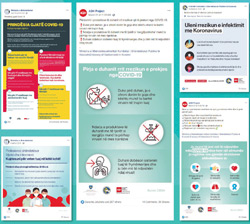
Kosovo
AQH Project response to the Covid-19 outbrea
AQH is intensively supporting experts and decision makers from national partner institutions in the area of communications. The messages, produced in minority languages too, aim to inform the population on protection measures as well as avoid misinformation on Covid-19.
Lessons learnt- Effective coordination among various stakeholders at national level promotes consistent messages that foster clarity and avoids confusion.
- Participatory approach and expertise representation from different backgrounds including: public health, health care management, epidemiology, primary healthcare, communication and media, building consensus on priority identification contributes to high impact dissemination. One important advantage is the multi-way of communication supported, with social media as the main one.
- Using only trustful and quoted information resources, e.g. WHO, international organisations and professional bodies, it puts distancing to fake news or unreliable information spread.
- Translated messages into minority languages assure better coverage and inclusive perspective which remains our aim.
Resources
Contact
Merita Stavileci
Senior National Programme Officer at Swiss Cooperation Office in Kosovo
merita.stavileci@eda.admin.ch
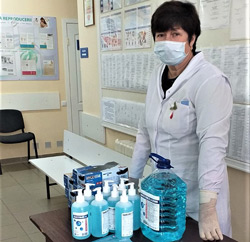
Moldova
Rapid reprogramming an NCD project to support the COVID-19 response
Moldova
has acted very quickly in its response. The Healthy Life Project
supports gender-sensitive messaging with a focus on NCD patients,
provides PPE to PHC staff, Community Social Workers and Home-based Care
workers. It has introduced evidence-based guidance regarding phone
consultations, and redesigned the Chronic Disease Self-Management
Programme to operate under remote support.
On March 7, 2020,
Moldova reported its first confirmed case of COVID-19 within its
borders. The Government acted quickly and declared a State of Emergency,
with the immediate mobilization of public authorities, public and
private service providers, and the entire population.
The Healthy
Life Project liaised rapidly with its national partners to identify key
needs. This included, that a staff member was released to re-join the
Ministry of Health, Labour and Social Protection (MoHLSP) and strengthen
their capacity for the response. Moreover, the annual workplan was
revisited and funds reprogrammed, for example from a small grant scheme
for Primary care facilities, to procure Personal Protective Equipment
(PPE) for family doctors, nurses and medical assistants in pilot raions.
In
addition, the project supports MoHLSP’s and the National Agency for
Public Health (NAPH) in their evidence-based communication efforts,
paying close attention to gender aspects, and tailoring messages towards
NCD patients as they are at particularly high risk.
At raion
and community level interdisciplinary Commissions for Exceptional
Situations were established, and the project’s Integrated Care pilot
sites facilitated a cross sectoral effort for streamlined communication,
supervision of community services, and management of workforce
protection. Again project resources were redirected for procurement of
PPE for Community Social Workers and Home Care workers.
Community
social workers play a leading role in disseminating information about
state support, including social and financial benefits, referrals and
access to counselling. The situation of returned migrants is
particularly acute and they need help to register as unemployed and
access benefits, while also handling the new situation of physical
distancing in families with children, people with disability, elderly.).
Home Care Workers continue to assist the elderly, distributing food
prepared under organization of Local Public Authorities to assure basic
needs.
Finally, the project’s Chronic Disease Self-Management
Programme (CDSMP) has been redesigned. Now support is being provided
remotely in 20 rural communities, with 279 NCD patients benefiting from
individual telephone discussions initiated by the 36 trained
facilitators. In 9 communities, under their own initiative,
self-management sessions are organized online through Viber or Messenger
communication platforms. One patient indicated: "We understand that we
are a vulnerable category in this period, both due to age and the NCDs
we suffer from. Because of this, there was a high degree of anxiety and
confusion. Yet the CDSMP is like a rescue boat, which helps and
motivates us to organize ourselves to solve problems through achievable
actions.”
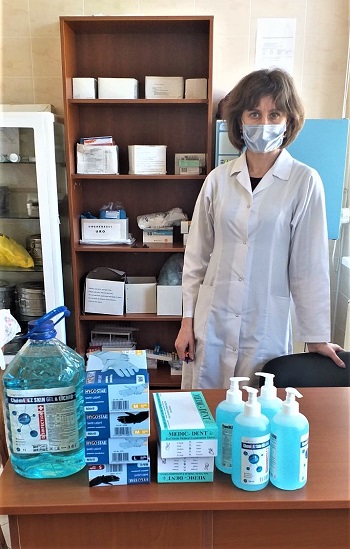
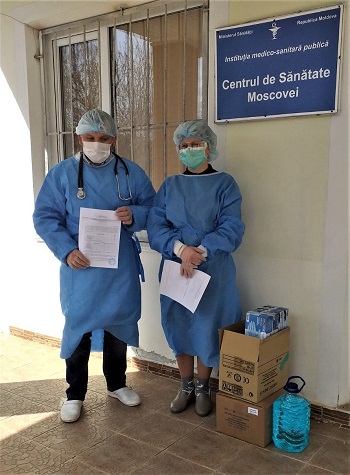
Resources
Contact
Dr. Ala Curteanu, Team Leader Healthy Life Project
ala.curteanu@viatasan.md
Dr. Valeriu Sava
National Program Officer Health, Swiss Cooperation Office in Moldova
valeriu.sava@eda.admin.ch
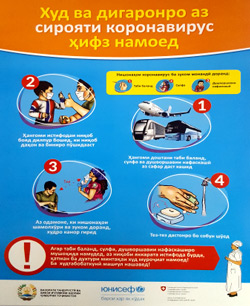
Tajikistan
Leveraging investment in PHC to support the national COVID-19 response
So
far Tajikistan has no confirmed cases. The Government is using the time
to prepare with its partners. SDC’s Enhancing PHC services Project is
supporting national training for health workers on case management and
contract tracing, printing of IEC materials, engagement of Community
Health Teams to disseminate accurate information, and the initiation of
an international procurement of PPE.
Officially, up to date April
14, Tajikistan has no confirmed COVID - 19 case. The Ministry of Health
and Social Protection (MoHSP) has been quick to work with international
donors to prepare for an effective response while there is still time
to do so.
Illustratively, since March 2020 SDC’s Enhancing
Primary Health Care Services Project has been supporting the Republican
Clinical Centre for Family Medicine of Republic of Tajikistan (RCCFM)
to conduct national trainings with health care providers on COVID-19
case management and contact tracing.
Learning modules, algorithms and
guidelines from the World Health Organization and adopted to the
country context by MoHSP and RCCFM form the basis of the training. The
early trainings took place under physical distancing in the classroom of
specialized training centres. However, now an online option with
training videos is being operationalized. Additionally, the EPHC
Project’s network of Peer groups of family doctors and nurses is being
leveraged to facilitate remote dissemination of this COVID-19 guidance.
Moreover, an international procurement of Personal Protective Equipment
for health workers has been initiated.
The EPHC
project is working closely with the Republican Healthy Lifestyle Centre
(RepHLSC) to roll out the National Guideline “Partnership with
communities on health issues”. Within the frame of this Guideline,
RepHLSC developed a “Training manual for PHC facilitators on Health
Actions on a variety of health issues”. The topic “Prevention of
coronavirus infection” has been now been added to the Training manual.
In
March 2020, RepHLSC organized trainings for the facilitators of PHC
facilities on the prevention of coronavirus infection and supplied them
with IEC materials (posters, booklets and leaflets) on COVID-19
prevention that were printed and disseminated through the support of SDC
and UNICEF. The 350 PHC facilitators that were trained are now
capacitating the Community Health Teams in the project’s pilot districts
Rudaki, Faizabad, Vose, Hamadoni and Konibodom to disseminate key facts
and information to the rural population to counter misinformation and
panic.
The CHTs encourage local people in their areas to keep the
recommendations on proper protection against COVID-19, as are being
followed by the health staff. Mass media has also been engaged, and
messages are being put out by Tajik local mobile operators (of MoHSP and
Emergency Situations Committee once a day on the prevention of
coronavirus in Russian and Tajik languages).
Contact
Dr. Gulara Afandiyeva, Head of Swiss TPH office
Dr. Gulzira Karimova, National Project Coordinator
Dr. Muazamma Dzhamalova,
National Program Officer Health, Swiss Cooperation Office in Tajikistan
muazamma.dzhamalova@eda.admin.ch
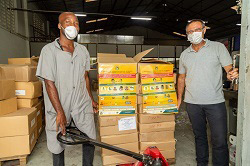
Tanzania
HPSS support to COVID-19 response
Since the beginning of March the Health Promotion and System Strengthening Project (HPSS) funded by the Swiss Agency for Development and Cooperation (SDC) has been engaged in supporting the Government of Tanzania in its COVID-19 Emergency Response Plan. The first COVID-19 infection case was reported in Tanzania on 17th March 2020 and, like in other countries worldwide, infections are spreading, with so far 49 confirmed cases (14th April 2020, Johns Hopkins University). The project is in constant contact with the responsible decision makers at the MoHCDGEC and PORALG and participates in the national task force and its subcommittees, which coordinate the Corona virus disease response between GoT and Development Partners.
HPSS has reallocated an amount of up to CHF 200’000 to support the GoT in the COVID -19 response. The project is actively engaged in the Risk Communication and Community Engagement Pillar of the Emergency Response Plan by providing the following support:
1. The HPSS project together with other partners including UNICEF, IMMA Health and UNFPA are working on enhancing capacity of the current hotline and elevating it to a national call centre for the COVID-19 with additional human resources, working tools and technology to ensure that it is functioning properly and contributes to information to communities and health authorities. This is a formidable challenge as in recent days more than 250’000 calls have been directed to the national COVID-19 response hotline which has very limited capacity to attend to the incoming calls.
2. Awareness raising of the transmission of the disease and knowledge on prevention and timely treatment seeking among health workers and communities including the most vulnerable in both mainland Tanzania and Zanzibar. To this effect the project printed 100’000 posters with different information on prevention, signs and symptoms of COVID-19 and it also arranged for the logistical distribution of the information material country-wide. HPSS also supported the airing of radio spots produced by the GoT and their broadcasting in both national and on local community radio stations.
3. The HPSS project also endeavours to help out the GoT with any transport needs that will be related to COVID-19 activities through the use of its project vehicles for central level activities and at the 8 HPSS zonal offices.
With these contributions to the national COVID-19 response the HPSS project is working with key national stakeholders to respond to the current health crisis in Tanzania and hopes to strengthen future epidemic resilience in the country.
Resources
Contact
Ally-Kebby Abdallah, Project Manager HPSS Project, ally.kebby@hpss.or.tz
German M. Pacheco, Swiss TPH Country Director Tanzania, german.martinezpacheco@swisstph.org
Manfred Stoermer, Project Director HPSS, Swiss TPH, manfred.stoermer@swisstph.ch
Dr. Kate Molesworth, Health promotion Specialist HPSS, Swiss TPH, kate.molesworth@swisstph.ch
Jacqueline Matoro
National Programme Advisor for Health, Swiss Cooperation Office in Tanzania
jacqueline.matoro@eda.admin.ch
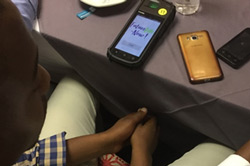
Zimbabwe
Digitalization’s slowly creeps into SDC supported project
FutureLife- Now! an SDC supported project implemented by the Media in Education Trust has introduced biometric technology in its M&E system. The system provides for live transmission of data from project sites to MIET Africa. Secondly, the perennial challenge of double counting participants on an intervention has been wiped out as the system uses a unique identifier for each different participant on the project.
For the first time it will be possible to measure the intensity of service provision to the school pupils and what services are in demand. For health service providers linked to the schools under the project, it is now possible to track which pupils comes from which school and for what service(s). This kind of information enables health service providers to identify schools where e.g. HIV testing, access SRH services etc. is on high demand thus facilitating a clear understanding of both the demand and supply side.
From the 02 March 2020, Broccoli, a semi private/public Technology Company supplied the biometric devices to MIET facilitators in Lesotho, trained the users (Fig 1) and supported the first registration process of the pupils at Thetsane High School-Maseru High school in Maseru district (Fig 2). The biometric technology for M&E is being rolled out through the FutureLife-Now! project to Malawi, Zambia and most likely Zimbabwe.
Its roll out will enable SDC partners to report accurate data of their reach and impact in the different countries. Accurate data on HIV related services enables SDC to measure its contribution to the reduction of new HIV infections among young people in the SADC region and thus contributing to the achievement of SDG Target 3.3: end AIDS as a public health threat by 2030.


Contact
Edson Mugare
Cooperation Office Harare
edson.mugore@eda.admin.ch
